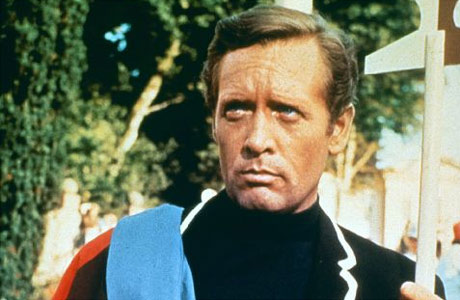
Neither as resonant as
Letters from Iwo Jima or
Mystic River nor as atrocious as
Million Dollar Baby or
Flags of our Fathers,
Clint Eastwood’s Gran Torino is a solid, decently engaging, and even well-meaning two hours of cinema, despite the seemingly endless tirade of dated ethnic slurs issuing from Eastwood’s mouth therein. (Like Alvy Singer, Eastwood’s Walt Kowalski is
a bigot, but for the left.) Its goofy and often didactic racists-have-a-heart-too messaging aside,
Torino — or, as
my dad accurately labeled it,
Dirty Old Man Harry — pretty clearly attempts to be the coda and meta-commentary on Eastwood’s famous vigiliante films that
Unforgiven (more successfully) was to his westerns.
Yet, even if it’s clunky and heavy-handed at times, and even if its over-the-top ending seems lifted straight out of your average Mel Gibson movie (you’ll know what I mean if/when you see it), I still ended up feeling reasonably charitable towards Torino in the end, perhaps because it’s good to see Eastwood, aged and wizened but with a undeniable twinkle in his eye, still willing to draw outside the lines of his cinematic legacy. (And perhaps because, speaking as someone of the Caucasian persuasion — or at worst a “mick” — we get off easy. I could imagine feeling much less sanguine about listening to a mostly-white audience chuckle and guffaw their way through the litany of racial slurs here, if they felt directed at me or my kids.)
If you saw any of the trailers for Gran Torino, you’re pretty much up to speed. The 1972 muscle car in question is the MacGuffin of this particular tale, and, with the passing of his wife, one of the three things left in this world still loved unconditionally by retired autoworker and Korean war vet Walt Kowalski (Eastwood) — the other two being his aging golden retriever and watery American beer. Basically written off by his biological family as a cantankerous, curmudgeonly funeral-waiting-to-happen (his granddaughter is particularly one-dimensional in this regard — she reminded me of Hillary Swank’s redneck family in MDB), Walt is for all intent and purposes an island unto himself in his Michigan neighborhood, which is now mostly populated by Hmong emigrants. His only friends are the other (white) retirees down at the local, with whom he occasionally shares a drink or three, and his “dago” barber (John Carroll Lynch), with whom he occasionally engages in what passes for witty ethnic repartee.
But when the boy-next-door Tao (Bee Vang) is enticed by the local gang to steal Walt’s Gran Torino as part of his initiation, and the girl-next-door Sue (Ahney Her) gets pawed walking home from school by some local African-American youths (Walt would use another term), Kowalski becomes increasingly drawn into the life of the Hmong community all around him despite himself. And soon, in full defiance of his oft-professed contempt for “gooks” and “zipperheads,” Walt takes it upon himself to educate Tao in the ways of true American manhood (which apparently is comprised of being good with tools and ethnic banter — who knew?) Still, that aforementioned gang ain’t going anywhere, and — worse for Walt, Tao, and particularly these hapless gang members — they don’t seem to have ever watched Dirty Harry. Clearly, somebody in the neighborhood is going to have to stand up to this crew…but, at his advanced age, laying down the law with the barrel of a big gun just doesn’t make Walt’s day quite like it used to.
In the end, Torino actually reminded me less of the glory days of Harry Callahan than of another film I happened to catch last week (on Blu-Ray), Tom McCarthy’s The Visitor. Gran Torino and The Visitor play like the (aging) McCain and Obama voters’ guides to 21st Century Immigrants respectively. In both films, an older white guy in a rut has his heart opened and life transformed by America’s spunky newest arrivals, until he gets a first-hand taste of the downside of new-immigrant life. (In one case, ethnic gangs; in the other, the INS.) Both are commendable films anchored by impressive and even nomination-worthy lead performances (in The Visitor‘s case, by Richard Jenkins)…but both exude more than a whiff of Bagger Vance-ish sentiment in their storytelling. (See also Gbenga Akinnagbe’s character in the otherwise solid The Savages.) In other words, the immigrants in question often feel like static plot points to move the white fellow’s story arc forward rather than full-fledged characters themselves.
Now, there’s no one in Torino as galling in this regard as Haaz Sleiman’s ridiculously friendly Syrian drummer in The Visitor, but the feeling persists nonetheless, particularly in the way Walt’s Hmong neighbors continually just shrug off the voluminous stream of bile emanating from his mouth. Eastwood or no, it’s hard to shake the sense that Walt’s blustery bravado would’ve at the very least cut back on the respectful offerings he’s given and Asian barbeques to which he’s invited during the film, and more than likely quite justifiably would’ve gotten his teeth kicked in a few times before the events shown here. Of course, in the world according to Gran Torino, physical violence is ultimately never the answer. So what the hell are we supposed to use, man? Harsh language?









